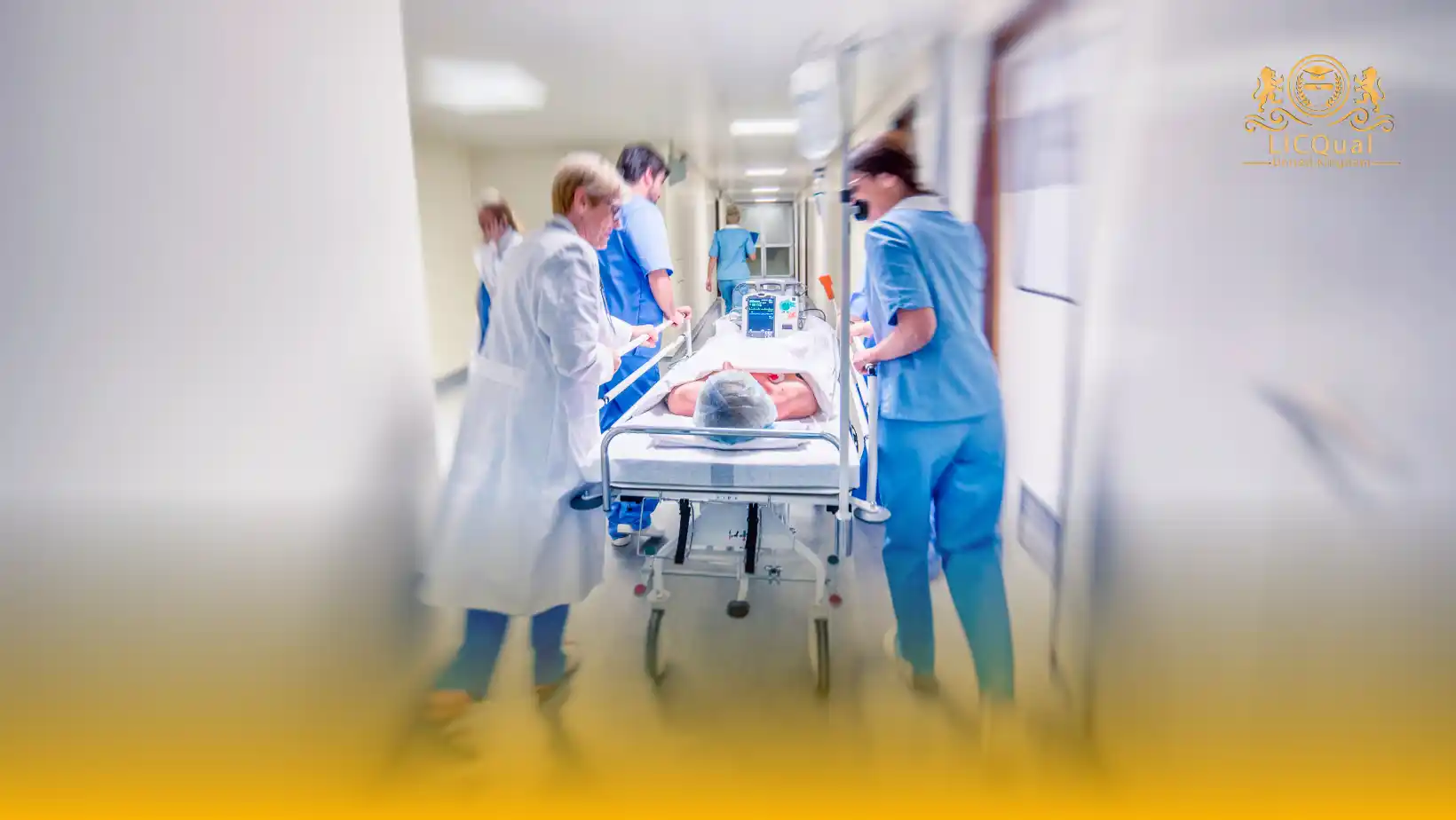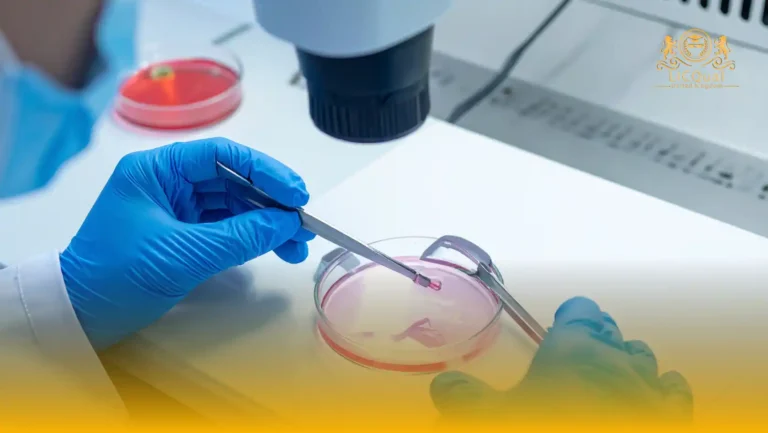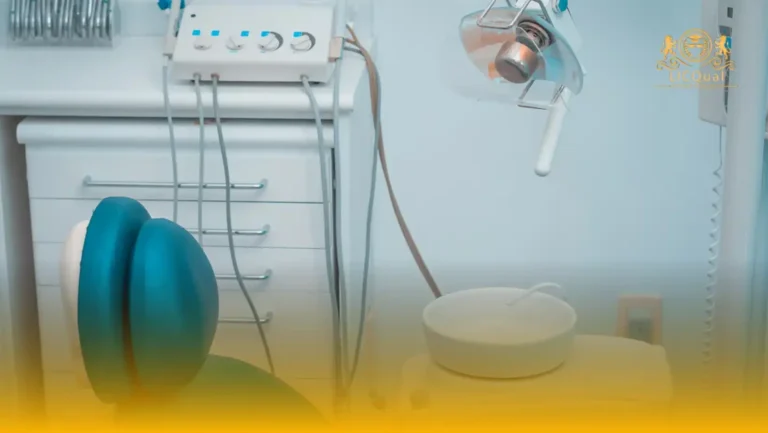The LICQual Level 7 Postgraduate Diploma in Emergency Medicine (PgDEM) is a highly specialised programme designed for healthcare professionals seeking to enhance their expertise in acute and critical care. This advanced qualification is not intended for fresh candidates but is tailored for experienced practitioners who aim to progress their careers, strengthen their clinical decision-making skills, and expand their knowledge in the fast-paced and high-stakes field of emergency medicine.
Emergency medicine is a vital discipline that requires rapid diagnosis, immediate interventions, and effective management of life-threatening conditions. This postgraduate diploma equips learners with advanced clinical competencies, evidence-based practices, and leadership abilities to manage complex emergencies confidently. The programme also supports Continuing Professional Development (CPD), ensuring that learners remain at the forefront of medical advancements and evolving healthcare standards.
Centres delivering this qualification must demonstrate excellence in teaching and support. This includes employing competent and highly qualified staff, providing access to modern resources, and maintaining robust learning facilities to ensure high-quality training. Centres must also integrate practical and theoretical approaches, enabling learners to apply advanced knowledge directly to clinical practice.
By completing the Level 7 Postgraduate Diploma in Emergency Medicine, learners will be well-prepared to pursue senior roles within hospitals, emergency departments, trauma care units, and healthcare organisations worldwide. This qualification reflects international standards of training, empowering professionals to make a meaningful impact in critical healthcare delivery and to enhance patient outcomes in emergency settings.
Course Overview
Qualification Title
LICQual Level 7 Postgraduate Diploma in Emergency Medicine (PgDEM)
Total Units
6
Total Credits
120
GLH
600
Qualification #
LICQ2200962
Qualification Specification
To enroll in the LICQual Level 7 Postgraduate Diploma in Emergency Medicine (PgDEM), applicants must meet the following criteria:
|
Qualification# |
Unit Title |
Credits |
GLH |
|---|---|---|---|
|
LICQ2200962-1 |
Advanced Principles of Emergency and Acute Care Medicine |
20 |
100 |
|
LICQ2200962-2 |
Trauma Management and Critical Care Interventions |
20 |
100 |
|
LICQ2200962-3 |
Emergency Diagnostic Techniques and Clinical Decision-Making |
20 |
100 |
|
LICQ2200962-4 |
Leadership, Risk Management, and Ethical Practice in Emergency Medicine |
20 |
100 |
|
LICQ2200962-5 |
Disaster Medicine, Pre-Hospital and Mass Casualty Management |
20 |
100 |
|
LICQ2200962-6 |
Research Methods and Evidence-Based Practice in Emergency Medicine |
20 |
100 |
By the end of this course, learners will be able to:
Unit 1: Advanced Principles of Emergency and Acute Care Medicine
- Critically evaluate the principles of advanced emergency and acute care medicine.
- Apply evidence-based protocols for the management of life-threatening emergencies.
- Demonstrate advanced skills in airway management, resuscitation, and cardiovascular support.
- Analyse complex patient presentations and formulate effective care plans.
- Integrate multidisciplinary approaches to optimise patient outcomes.
Unit 2: Trauma Management and Critical Care Interventions
- Assess and manage trauma cases using internationally recognised trauma life support protocols.
- Implement critical care interventions for stabilisation of patients with severe injuries.
- Demonstrate proficiency in surgical and procedural interventions in trauma scenarios.
- Critically evaluate strategies for multi-system trauma management.
- Apply ethical and safe practices in high-pressure trauma care environments.
Unit 3: Emergency Diagnostic Techniques and Clinical Decision-Making
- Utilise advanced diagnostic tools including imaging, laboratory, and bedside assessments.
- Apply critical thinking skills in rapid decision-making during emergency scenarios.
- Interpret complex diagnostic results to guide patient management.
- Evaluate the role of technology and innovation in emergency diagnostics.
- Develop effective clinical judgement under conditions of uncertainty.
Unit 4: Leadership, Risk Management, and Ethical Practice in Emergency Medicine
- Demonstrate leadership and teamwork skills in emergency medicine environments.
- Apply principles of risk management to improve patient safety and care quality.
- Critically examine ethical and legal considerations in emergency medical practice.
- Lead multidisciplinary teams during crisis situations with professionalism.
- Evaluate healthcare policies and frameworks in relation to emergency medical practice.
Unit 5: Disaster Medicine, Pre-Hospital and Mass Casualty Management
- Develop effective disaster preparedness and response strategies.
- Apply triage systems for pre-hospital and mass casualty incidents.
- Coordinate with emergency services and humanitarian organisations during disasters.
- Evaluate public health responses in large-scale emergencies.
- Critically analyse case studies of disaster and mass casualty management globally.
Unit 6: Research Methods and Evidence-Based Practice in Emergency Medicine
- Critically appraise research methodologies relevant to emergency medicine.
- Apply evidence-based practices to enhance clinical decision-making.
- Design and conduct independent research projects in emergency medicine.
- Evaluate current literature and research to inform best practices.
- Communicate research findings effectively to both academic and clinical audiences.
The LICQual Level 7 Postgraduate Diploma in Emergency Medicine (PgDEM) is designed for both experienced healthcare professionals and beginners who want to build a career in acute and critical care. This internationally recognized Level 7 Emergency Medicine qualification provides CPD accredited training, practical skills, and evidence-based knowledge. Whether you are a doctor, nurse, paramedic, or a career changer entering healthcare, this program equips you with the expertise to deliver safe and effective emergency medicine services.
1. Medical Doctors and Physicians
- Strengthen expertise in diagnosing and managing complex emergency cases
- Gain CPD accredited postgraduate training in acute and critical care
- Expand practice offerings with advanced emergency medicine services
- Build authority with an internationally recognized Level 7 qualification
- Meet patient demand for evidence-based emergency interventions
2. Nurses and Mid-Level Practitioners
- Transition into emergency medicine with structured postgraduate training
- Learn advanced diagnostic and patient management techniques
- Increase career opportunities in hospitals, clinics, and trauma centers
- Develop confidence in delivering safe and effective emergency care
- Earn a globally recognized diploma to enhance professional credibility
3. Paramedics and Allied Health Professionals
- Diversify practice by adding emergency medicine specialization
- Master trauma care, resuscitation protocols, and patient-centered strategies
- Attract new opportunities in pre-hospital and acute care settings
- Gain CPD accredited certification for career advancement
- Position yourself as a trusted provider in emergency medicine
4. Beginners Entering Healthcare
- Start a career in emergency medicine with guided, step-by-step modules
- Learn core skills in patient assessment, diagnosis, and treatment planning
- Access internationally accredited postgraduate training without prior specialization
- Build a strong foundation for future advanced qualifications
- Join one of the best postgraduate emergency medicine courses UK for beginners
5. Career Changers
- Transition into healthcare and emergency medicine from other industries
- Acquire practical skills in acute care and trauma management
- Gain global recognition with a Level 7 postgraduate diploma
- Explore new opportunities in hospitals, clinics, and emergency departments
- Build a rewarding career in a fast-growing medical specialty
6. International Healthcare Professionals
- Earn a qualification recognized across global healthcare systems
- Access CPD accredited training aligned with international standards
- Strengthen career prospects in emergency medicine worldwide
- Learn evidence-based techniques for safe patient care
- Expand practice opportunities in both local and international markets
7. Professionals Seeking Academic and Career Growth
- Advance knowledge with evidence-based postgraduate emergency medicine training
- Strengthen EEAT compliance with authoritative certification
- Gain expertise in acute and critical care for career progression
- Build credibility with patients and employers through accredited learning
- Position yourself as a leader in emergency medicine education and clinical practice
Centres offering the LICQual Level 7 Postgraduate Diploma in Emergency Medicine (PgDEM) must meet strict requirements to ensure that learners receive a high standard of education and practical training. These requirements are designed to maintain academic excellence, professional integrity, and compliance with international standards in emergency medical education.
To deliver this qualification, centres must ensure the following:
- Qualified Teaching Staff: Trainers and assessors must hold relevant academic qualifications and substantial professional experience in emergency medicine, acute care, or related medical fields.
- Access to Clinical Resources: Centres must provide appropriate facilities such as simulation labs, case study resources, emergency care equipment, and access to clinical practice scenarios to enhance learner experience.
- Comprehensive Learning Materials: Centres should offer up-to-date textbooks, journals, e-learning platforms, and research materials covering emergency and critical care medicine.
- Robust Assessment Systems: Reliable methods of learner assessment, including case-based discussions, practical evaluations, and written assignments, must be in place.
- Support Services for Learners: Academic guidance, mentoring, and career support services should be available to help learners progress successfully through the qualification.
- Commitment to Quality Assurance: Centres must demonstrate compliance with international academic standards, continuous improvement practices, and learner-focused delivery methods.
- Technological Infrastructure: Availability of online learning platforms, virtual classrooms, and digital resources to support blended or distance learning where applicable.
- Professional and Ethical Standards: Centres must ensure that teaching and assessment practices uphold professional ethics, patient confidentiality, and learner integrity.
By fulfilling these centre requirements, training providers can deliver a high-quality postgraduate diploma in emergency medicine that equips learners with the advanced knowledge and clinical expertise required to excel in this critical field.
Assessment and Verification
All units within this qualification are subject to internal assessment by the approved centre and external verification by LICQual. The qualification follows a criterion-referenced assessment approach, ensuring that learners meet all specified learning outcomes.
To achieve a ‘Pass’ in any unit, learners must provide valid, sufficient, and authentic evidence demonstrating their attainment of all learning outcomes and compliance with the prescribed assessment criteria. The Assessor is responsible for evaluating the evidence and determining whether the learner has successfully met the required standards.
Assessors must maintain a clear and comprehensive audit trail, documenting the basis for their assessment decisions to ensure transparency, consistency, and compliance with quality assurance requirements.







